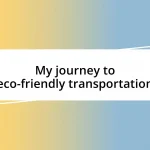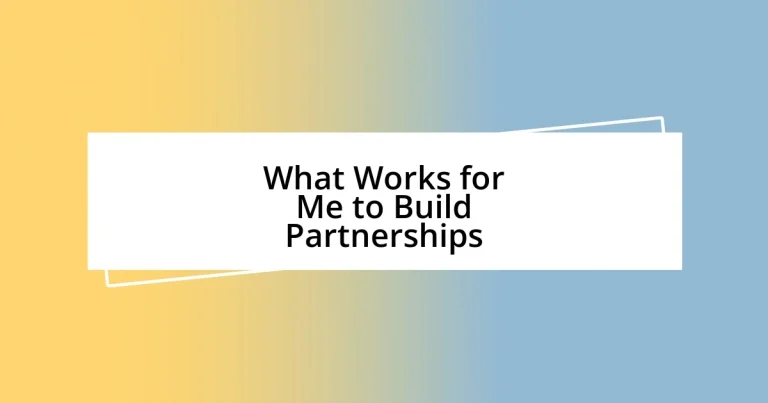Key takeaways:
- Partnerships enhance creativity and bring diverse perspectives, easing challenges and fostering trust and community.
- Effective communication—through openness, active listening, and feedback—strengthens collaboration and develops rapport.
- Celebrating shared achievements and regularly revisiting goals sustain long-term partnerships and deepen connections.
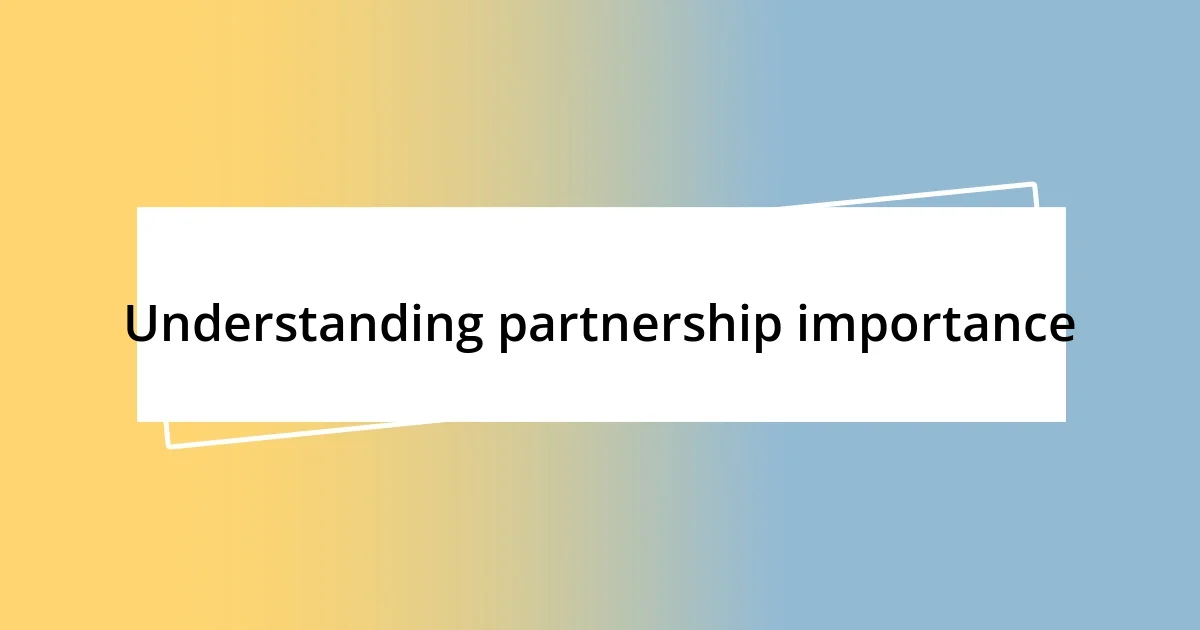
Understanding partnership importance
Partnerships are the backbone of success in both business and personal contexts. I remember when I collaborated with another local entrepreneur; we exchanged ideas that blossomed into a thriving project. Reflecting on that experience, it’s clear that diverse perspectives can drive creativity and innovation.
Have you ever tried to navigate a challenge alone? It can feel isolating. I realized that building partnerships not only lightens the load but also brings fresh energy and motivation. The blend of knowledge and resources can lead to outcomes we might never achieve on our own.
Moreover, partnerships foster trust and community. In my journey, I’ve seen how shared goals can strengthen relationships and create a support system that extends beyond the initial purpose. When there’s a genuine connection and understanding, both parties flourish, creating a ripple effect of growth, learning, and success.
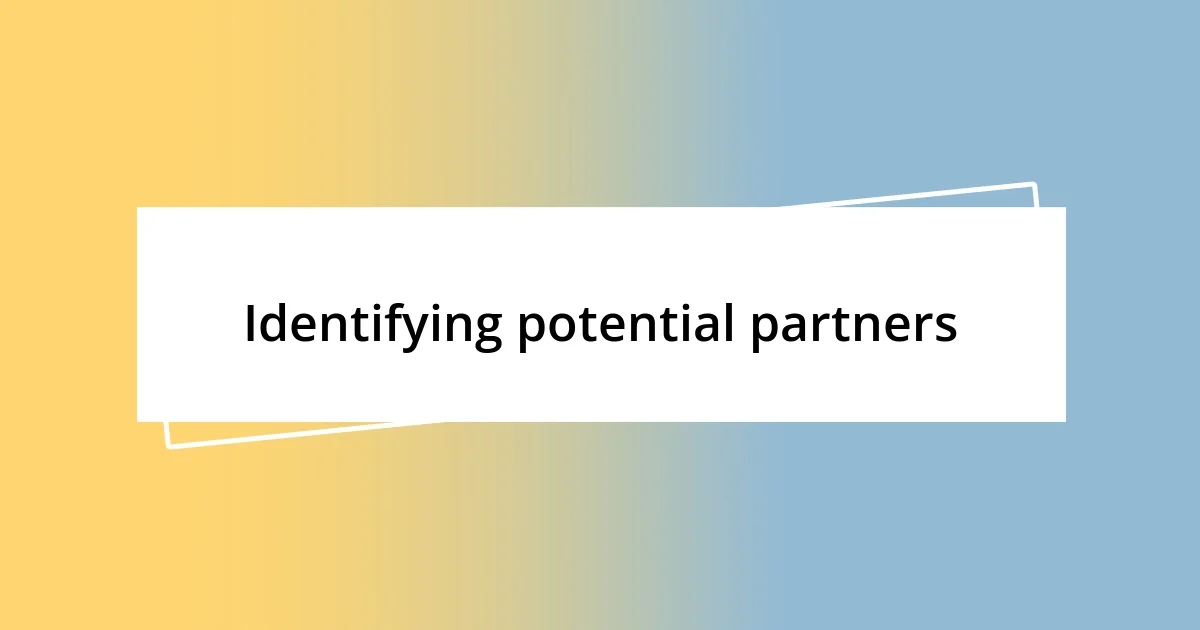
Identifying potential partners
Identifying potential partners starts with understanding what you bring to the table. When I think about partnerships, I often reflect on my first significant collaboration. It was with a nonprofit organization that shared my passion for community development. By aligning our missions, we not only complemented each other’s strengths but also discovered unique opportunities for outreach. This experience taught me that clarity in vision is key when searching for the right partners.
Another factor to consider is shared values and goals. I recall a time when I evaluated potential partners for a project. Instead of just focusing on skill sets, I held discussions to gauge our foundational beliefs and objectives. Those conversations illuminated mutual aspirations and created a strong basis for collaboration. Identifying partners with similar motivations can amplify your impact and cultivate a deeper connection throughout the partnership.
Finally, networks can be invaluable in identifying potential collaborators. I often engage with my existing contacts to learn about others who may be seeking partnerships. Just recently, I was introduced to someone whose expertise perfectly matched my project’s needs, resulting in a fruitful collaboration. I believe that leveraging your network not only expands your reach but also uncovers hidden opportunities for meaningful partnerships.
| Criterias | Examples |
|---|---|
| Complementary Skills | Partner with unique expertise, like a marketer if you’re a product developer. |
| Shared Values | Collaborate with organizations that align with your mission, like local charities focused on community growth. |
| Networking | Attend industry events or utilize LinkedIn to connect with potential partners. |
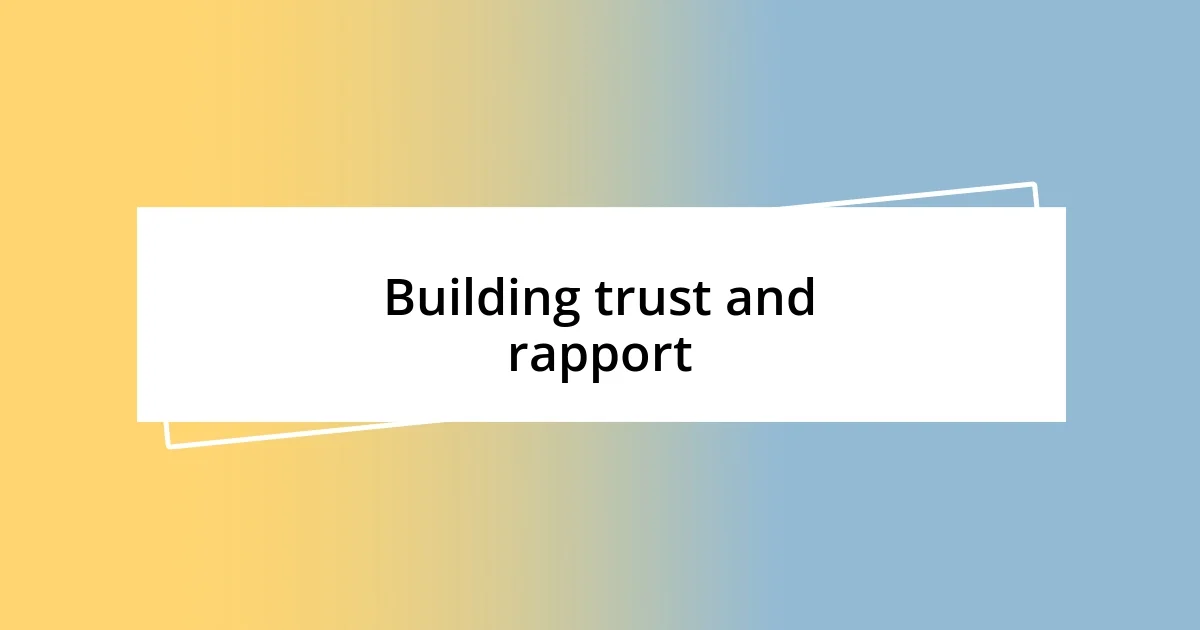
Building trust and rapport
Building trust and rapport is essential to any partnership. From my experience, the foundation lies in open communication. I recall a time I misinterpreted a partner’s intentions due to vague assumptions. That moment taught me how important it is to address doubts directly. Sharing thoughts and feelings fosters transparency, giving both sides a sense of security and belonging.
When you focus on establishing rapport, consider these key strategies:
– Be Authentic: Share your true self and experiences. It helps create an environment where others feel comfortable doing the same.
– Listen Actively: Pay attention to what your partner says without planning your response in advance. This shows that you value their input.
– Follow Through: Keep promises and commitments. Reliability builds loyalty and instills confidence in the partnership.
– Show Empathy: Understanding your partner’s perspective can help in overcoming obstacles together. It makes collaborative problem-solving more effective.
– Celebrate Small Wins: Acknowledging achievements, no matter how small, reinforces positive experiences and strengthens the bond.
Trust isn’t built overnight, but by nurturing these elements, you can create a robust foundation for any partnership.
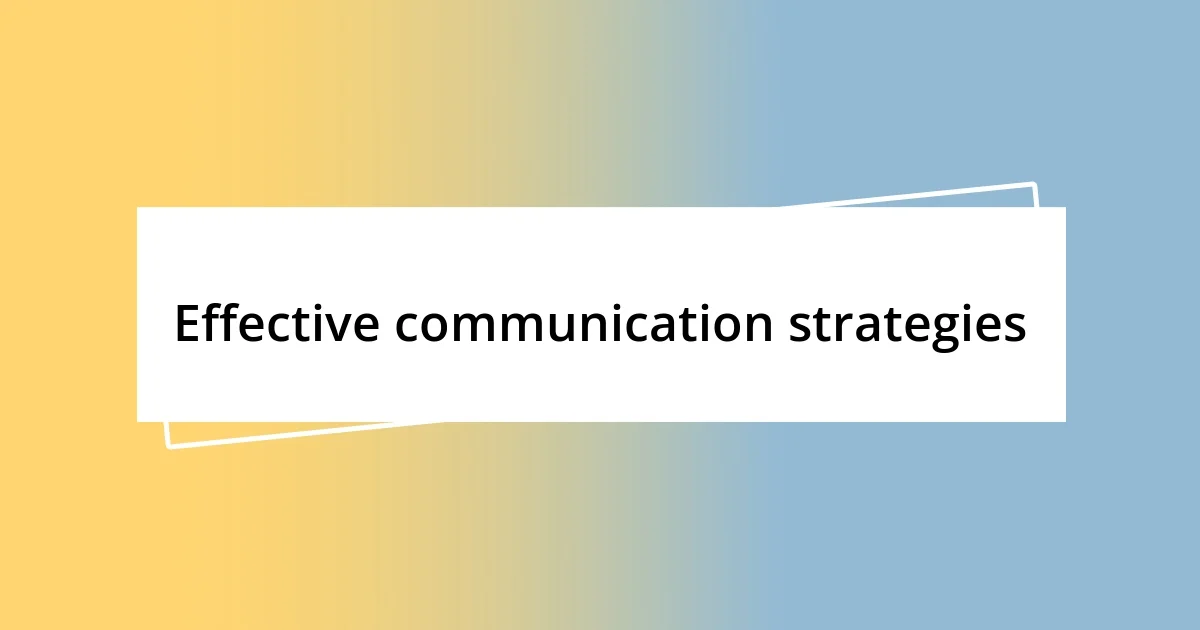
Effective communication strategies
Effective communication is a cornerstone of successful partnerships. I remember a time I faced a significant challenge when a project hit a snag due to misaligned expectations. Instead of letting frustration build, I took a step back and reached out for a candid conversation. This experience taught me the value of clarity and directness in communication—asking questions and actively listening can bridge gaps faster than I ever anticipated.
I often find that establishing a feedback loop is crucial. After a recent collaborative project, I scheduled a debriefing session where we shared insights about what worked and what didn’t. This open dialogue not only pinpointed areas for improvement but also reinforced our commitment to mutual growth. Isn’t it fascinating how understanding each other’s perspectives can foster deeper connections and enhance future collaborations?
Moreover, I like to use innovative tools to facilitate communication. During my last partnership, we leveraged project management software that allowed us to track progress and share updates in real time. This shift transformed our communication dynamics, making it easier to stay aligned and engaged. Have you ever experienced how the right tools can simplify complex exchanges? It’s remarkable how technology can enhance our collaborative efforts.
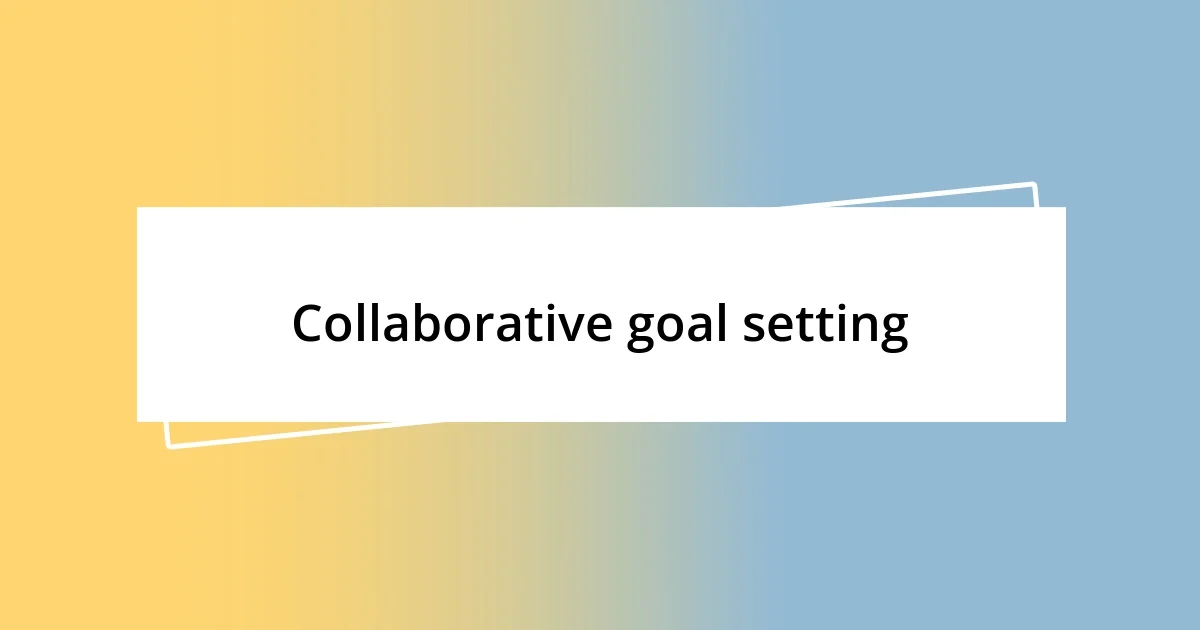
Collaborative goal setting
Collaborative goal setting is not just about agreeing on objectives—it’s about mutual investment in each other’s success. I vividly remember a project where I sat down with my partner to outline our targets. Instead of simply setting standard goals, we decided to co-create specific benchmarks that reflected both of our aspirations. This approach made each milestone feel like a shared victory, illuminating the power of joint ownership in achieving results.
Another aspect I find vital is the flexibility surrounding those goals. I recall a moment when we had to pivot due to unforeseen challenges. Rather than seeing this as a setback, we saw it as an opportunity to reevaluate our objectives together. This adaptability meant we not only maintained our alignment, but it also deepened our partnership. Have you ever faced a situation where change led to better outcomes? It’s a refreshing reminder of how collaboration unfolds.
I also believe that periodically revisiting our goals strengthens our partnership. In my experience, setting aside time for reflection helps us celebrate achievements and reassess our direction. Recently, after completing a project, we held a review session that sparked new ideas for our next collaboration. This reflective practice keeps the partnership dynamic and fosters a culture of continuous improvement. How often do you take the time to check in on your shared goals? It’s an illuminating exercise for any partnership.
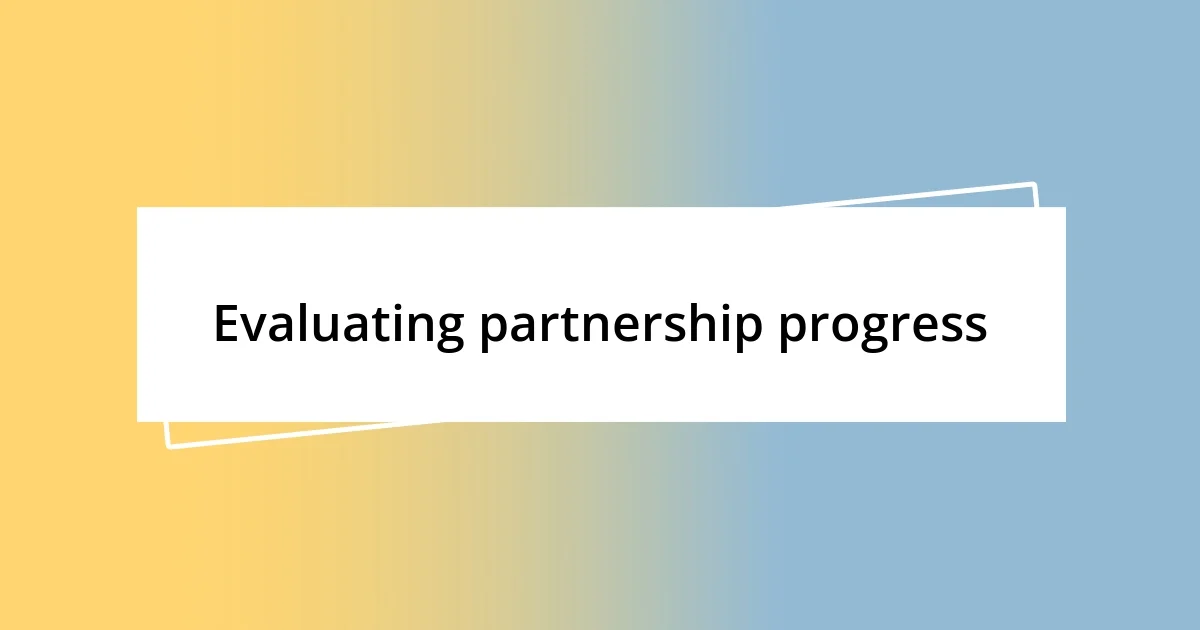
Evaluating partnership progress
Evaluating partnership progress is an ongoing journey that deserves attention. There was a time when I and my partner noticed some discrepancies in our expectations. We decided to set up a mid-project review, and I was surprised at how quickly we uncovered several misalignments. Seeing how our conversations clarified misunderstandings was not just enlightening; it was a game changer for our collaboration.
I’ve found that using concrete metrics and benchmarks provides a solid foundation for evaluation. After implementing some performance indicators in one of my partnerships, the results became crystal clear. Tracking our progress in this way didn’t just highlight our achievements; it opened doors to discussions that led to even greater synergies. Have you ever considered how easy it can be to overlook small wins? Recognizing those milestones can surely fuel motivation.
There’s also something powerful about sharing reflections with each other. I remember one assessment session that took a different turn; rather than simply focusing on what wasn’t working, we celebrated our strengths and unique contributions. The emotional uplift in that room was palpable—it reinforced our trust and commitment. How often do we take a moment to appreciate the journey we’ve taken together? These moments often reveal the depth of partnership that mere goal tracking might miss.
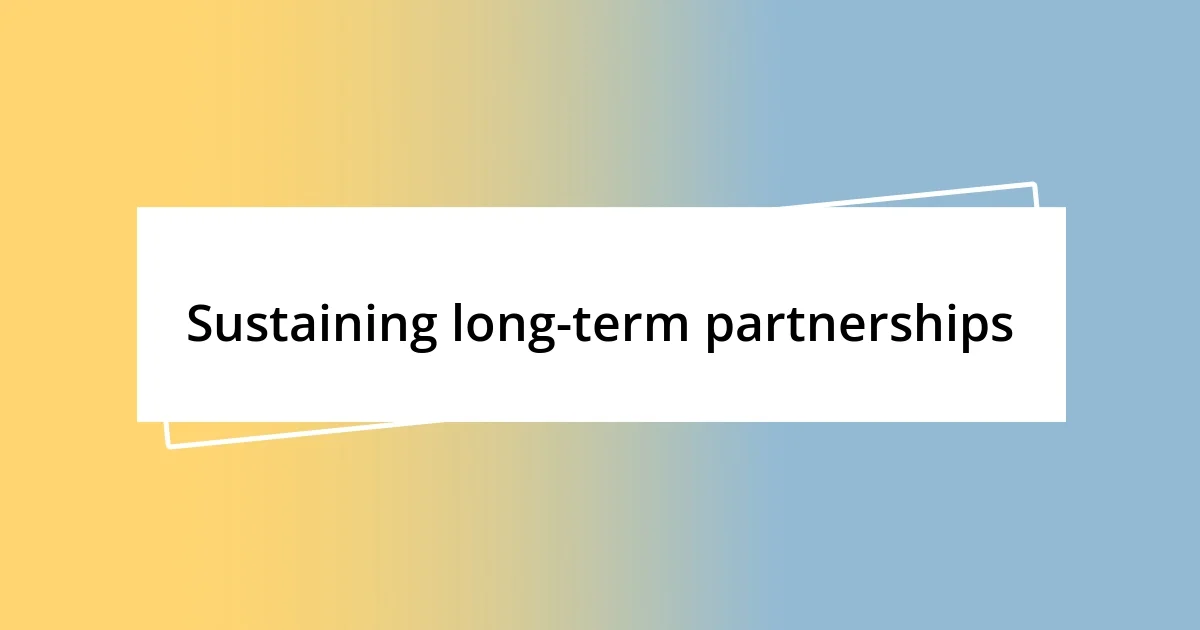
Sustaining long-term partnerships
Maintaining long-term partnerships requires consistent communication and transparency. I’ve learned that open dialogue becomes the backbone of a lasting relationship. There was a period when I noticed my partner pulling back during a particularly demanding phase of our project. Instead of ignoring it, I reached out to discuss how we were feeling about our collaboration. That honest conversation not only cleared the air; it also strengthened our bond, highlighting the importance of sharing our thoughts, even the uncomfortable ones.
Another key aspect is cultivating trust through shared experiences. I remember attending an industry conference with my partner, where we both stepped out of our comfort zones. Engaging with others and exchanging ideas strengthened our ability to discuss our vulnerabilities. Have you ever shared a challenging moment with someone, only to find it fosters a deeper connection? These experiences remind me that trust isn’t built solely on successes but often flourishes in moments of honesty and collaboration.
Finally, celebrating shared milestones is crucial for sustaining partnerships. I try to carve out time to acknowledge both big wins and small triumphs. For instance, after launching a successful initiative, we took a moment to reflect over a meal, reminiscing about our journey. It’s heartening to look back and appreciate how far we’ve come together. How often do you pause to celebrate your partnership achievements? These moments of reflection not only reinforce our commitment but also have a way of reigniting our passion for the work we do together.









